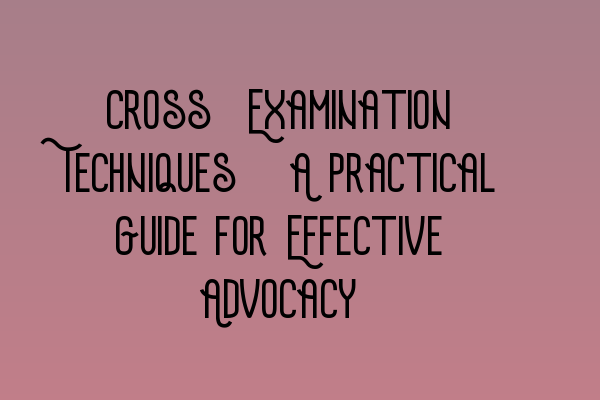Cross-Examination Techniques: A Practical Guide for Effective Advocacy
Welcome to the SQE Criminal Law & Practice Law UK blog! In this comprehensive guide, we will explore the essential cross-examination techniques that every advocate should master for effective advocacy in the courtroom. Cross-examination is a critical skill that allows lawyers to challenge witnesses, expose inconsistencies, and present their case in the most compelling manner.
The Importance of Cross-Examination
Cross-examination is an art that requires careful preparation and strategic execution. It is during cross-examination that advocates have the opportunity to test the credibility of witnesses, challenge their statements, and elicit favorable evidence for their clients. Effective cross-examination can make or break a case, as it allows advocates to shape the narrative and influence the trier of fact.
As an advocate, understanding and implementing effective cross-examination techniques is crucial for achieving success in the courtroom. It requires a combination of legal knowledge, persuasive skills, and strategic thinking. By utilizing the right techniques, advocates can effectively discredit the opposing party’s witnesses, establish their own case, and sway the decision-maker in their favor.
Cross-Examination Techniques
1. SQE 1 Practice Exam Questions: Developing a comprehensive understanding of the case and identifying the key areas of weakness in the opposing party’s evidence is essential. By thoroughly examining the available evidence, advocates can craft focused and impactful cross-examination questions.
2. SQE 1 Practice Mocks FLK1 FLK2: Preparation is key. Advocates must meticulously prepare their cross-examination strategy by conducting thorough research and organizing their questions in a logical sequence. Anticipating the witness’s potential responses and planning for various scenarios is crucial to stay agile and adaptable during the actual examination.
3. SQE 2 Preparation Courses: Effective communication skills are fundamental for successful cross-examination. Advocates must refine their questioning techniques, maintaining a clear and concise style that engages the witness and elicits the desired responses. Active listening is equally important, as it allows advocates to capitalize on unexpected opportunities and adapt their approach accordingly.
4. SQE 1 Preparation Courses: Building credibility with the trier of fact is essential. Advocates must establish their authority and expertise through their presentation, demeanor, and ability to effectively challenge witnesses. Maintaining professionalism, respect, and control during cross-examination is paramount, as it enhances the advocate’s credibility and persuasiveness.
5. SRA SQE Exam Dates: Timing is critical. Advocates must carefully manage the pace and flow of the cross-examination, ensuring that they cover all relevant topics while avoiding excessive repetition or irrelevant questioning. By maintaining control over the examination, advocates can effectively convey their case and maintain the attention of the trier of fact.
Conclusion
Mastering the art of cross-examination is an ongoing process that requires dedication, practice, and continuous improvement. As an advocate, the ability to effectively challenge witnesses, sway the decision-maker, and present a persuasive case is invaluable. By implementing the cross-examination techniques outlined in this guide and honing your skills through practice and experience, you can enhance your effectiveness in the courtroom and achieve favorable outcomes for your clients.
For more information on preparing for the SQE exams and improving your advocacy skills, take a look at our related articles:
- SQE 1 Practice Exam Questions
- SQE 1 Practice Mocks FLK1 FLK2
- SQE 2 Preparation Courses
- SQE 1 Preparation Courses
- SRA SQE Exam Dates
Thank you for reading and stay tuned for more informative articles from SQE Criminal Law & Practice Law UK!
